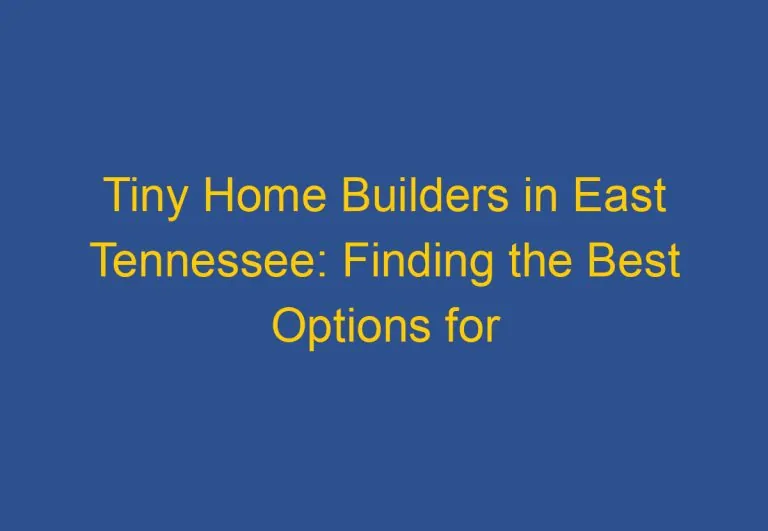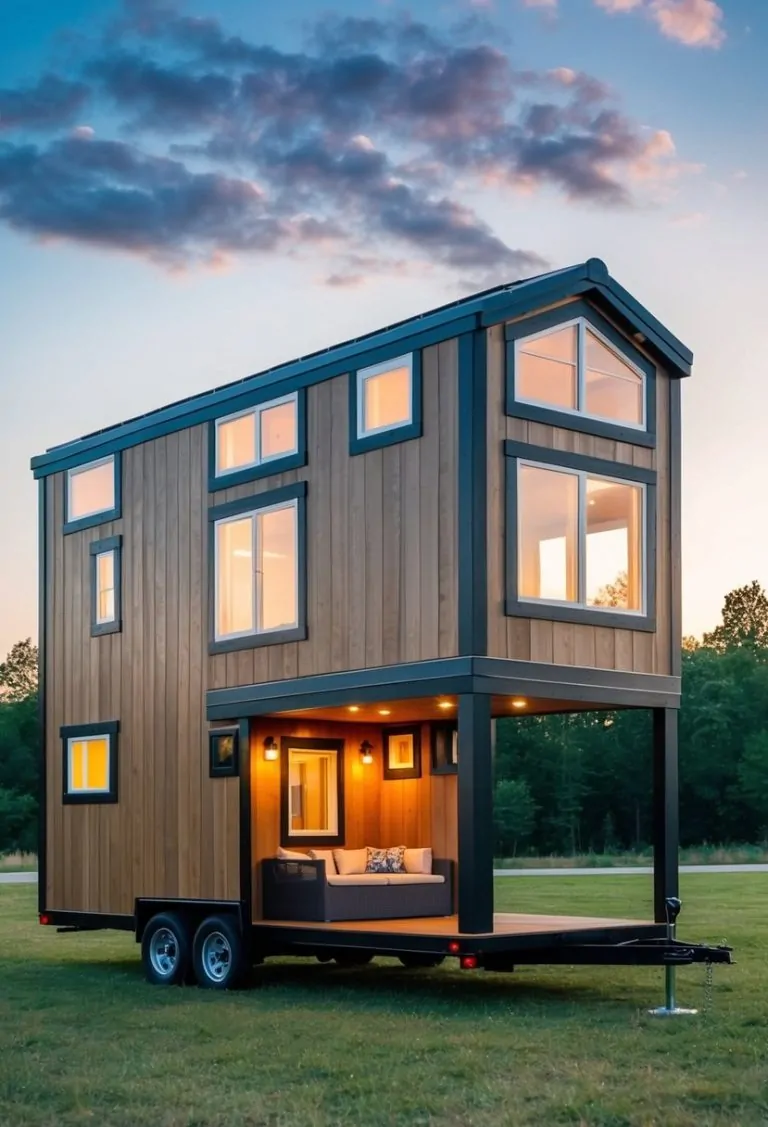Does NH Allow Tiny Homes? A Comprehensive Look at New Hampshire’s Laws and Regulations on Tiny Homes
Tiny homes have become a popular housing option for those seeking an affordable and minimalist lifestyle. However, many people are left wondering whether New Hampshire allows tiny homes. The good news is that tiny homes are indeed legal in the state of New Hampshire, but there are certain regulations and requirements that must be met.
As per the search results, tiny homes on wheels are considered recreational vehicles and are not allowed for year-round stay. Additionally, some municipalities in New Hampshire consider tiny homes to be accessory dwelling units. It is important to check the specific requirements and zoning laws of each county before building or buying a tiny home in New Hampshire.
The housing shortage in New Hampshire is a growing concern, and tiny homes can provide a solution for those seeking affordable housing options. However, it is important to ensure that the tiny home meets all the requirements of the International Residential Code (IRC) before moving in. With the right research and planning, a tiny home can be a viable and legal housing option in New Hampshire.
Legal Framework for Tiny Homes in New Hampshire
State and Municipal Zoning Laws
In New Hampshire, tiny homes are considered to be accessory dwelling units (ADUs) and are subject to state and municipal zoning laws. The state has passed a law to allow ADUs, and some municipalities in New Hampshire consider tiny houses to be ADUs. The zoning laws require the owner to live on site, but some municipalities allow tiny houses in all zoning districts that permit single-family dwellings.
Building Codes and Safety Standards
All municipal and state building codes for single-family dwelling units apply to tiny houses, including zoning, fire, safety, emergency vehicle access, attachments to electricity, plumbing, and public or private sewer systems, if required. Tiny dwellings in New Hampshire must have permanent construction that complies with guidelines and restrictions for small homes, as outlined in House Bill 588 and the 2015 IRC Appendix Q.
House Bill 588 and Its Implications
House Bill 588 provides guidelines and restrictions for tiny dwellings in New Hampshire to have permanent construction. The bill guarantees compliance and safety for permanent small home construction. Tiny houses on wheels are considered recreational vehicles and are not allowed for a year-round stay. The zoning board of adjustment may allow tiny houses in all other districts at its discretion.
In summary, New Hampshire allows tiny homes as ADUs, but they must comply with state and municipal zoning laws and building codes. Tiny homes must have permanent construction that complies with House Bill 588 and the 2015 IRC Appendix Q. While some municipalities allow tiny houses in all zoning districts that permit single-family dwellings, tiny houses on wheels are not allowed for a year-round stay.
Types of Tiny Homes and Regulations
Tiny Houses on Foundations
In New Hampshire, tiny houses on foundations are allowed as permanent structures. Guidelines and restrictions for small houses are provided by House Bill 588 and the 2015 IRC Appendix Q. These rules ensure compliance with permanent small home construction and safety. All municipal and state building codes for single-family dwelling units apply to tiny houses on foundations, including zoning, fire, safety, emergency vehicle access, attachments to electricity, plumbing, and public or private sewer systems, if required.
Tiny Houses on Wheels
Tiny houses on wheels are considered recreational vehicles in New Hampshire. Therefore, they are not allowed for a year-round stay. However, some municipalities in New Hampshire consider tiny houses on wheels to be accessory dwelling units. All municipal and state building codes for single-family dwelling units apply to tiny houses on wheels, including zoning, fire, safety, emergency vehicle access, attachments to electricity, plumbing, and public or private sewer systems, if required.
Transportation of tiny houses on wheels on public highways requires the use of a chassis and an engineer’s certification.
Accessory Dwelling Units
Accessory dwelling units (ADUs) are allowed in New Hampshire. Some municipalities consider tiny houses to be ADUs. All municipal and state building codes for single-family dwelling units apply to ADUs, including zoning, fire, safety, emergency vehicle access, attachments to electricity, plumbing, and public or private sewer systems, if required.
Detached ADUs require a special permit. They must comply with all zoning and building regulations.
In summary, New Hampshire allows tiny houses on foundations and ADUs. Tiny houses on wheels are allowed but are considered recreational vehicles and have restrictions. All municipal and state building codes for single-family dwelling units apply to tiny houses and ADUs.
Utilities and Infrastructure
Water and Sanitation Requirements
When it comes to water and sanitation requirements for tiny homes in New Hampshire, the regulations are similar to those for traditional homes. The state requires that homes have access to a public or private sewer system or a subsurface wastewater disposal system. If the home is not connected to a public water system, it must have a private well that meets the state’s standards for water quality.
Electricity and Energy Efficiency
Tiny homes in New Hampshire must meet the same energy efficiency standards as traditional homes. This includes complying with the International Energy Conservation Code 2015. The state also requires that all electrical work be performed by a licensed electrician and that the home be inspected and certified by an approved agency.
Emergency Services and Accessibility
Emergency vehicle access is an important consideration for tiny homes in New Hampshire. The state requires that all homes have adequate access for firefighting apparatus and emergency vehicles. Homes must also be equipped with self-contained drinking water and sanitary systems or be connected to a public sewer system.
Overall, while there are some differences in regulations for tiny homes in New Hampshire, they are generally subject to the same requirements as traditional homes. As long as the home meets all applicable regulations for plumbing, fire, safety, energy efficiency, and emergency services, it can be certified and inspected for permanent occupancy.
Ownership and Living in Tiny Homes
Tiny homes have become an increasingly popular housing option in recent years, and many people are curious about the regulations and requirements for owning and living in one. In New Hampshire, there are specific rules and regulations that must be followed to ensure that tiny homes are safe, affordable, and accessible for all.
Property Taxes and Real Estate Implications
One of the most significant concerns for tiny home owners is property taxes and real estate implications. In New Hampshire, tiny homes on wheels are considered recreational vehicles and are not allowed for year-round stay. However, some municipalities in New Hampshire consider tiny houses to be accessory dwelling units, which can have significant implications for property taxes and real estate.
Community and Lifestyle Considerations
Tiny homes can be a great way to live a more affordable and eco-friendly lifestyle, but there are also some important community and lifestyle considerations to keep in mind. For example, tiny home communities and parks are becoming more common in New Hampshire, and these can be a great way to connect with like-minded individuals and enjoy the benefits of shared facilities and resources.
When considering a tiny home, it’s important to think about the overall lot size, individual lots, and community wastewater and drinking systems. It’s also important to consider the facilities for sleeping and the minimum square footage requirements, as well as the egress roof access window and ceiling height requirements.
Overall, owning and living in a tiny home in New Hampshire can be an affordable and eco-friendly option for those looking for a unique housing option. However, it’s important to follow all regulations and work with a local engineer or third-party inspection company to ensure that your tiny home is safe, legal, and up to code.
Frequently Asked Questions
What are the regulations for tiny house living in New Hampshire?
New Hampshire has some regulations for tiny house living. The state follows the 2015 International Residential Code (IRC) Appendix Q, which provides guidelines for tiny houses. The code requires that tiny homes have an egress roof access window that satisfies Section R310.2’s standards for rescue operations and is built and installed for emergency escape. In a tiny house, the ceiling height in livable areas and passageways must be at least 6 feet 8 inches. All municipal and state building codes for single-family dwelling units shall apply to tiny houses, including zoning, fire, safety, emergency vehicle access, attachments to electricity, plumbing, and public or private sewer systems, if required.
Which towns in New Hampshire have zoning laws that accommodate tiny houses?
Grafton, Carroll, Coos, and Sullivan counties have no zoning ordinance. However, some towns in other counties may allow tiny houses under certain conditions. It is important to check with the local zoning board before building or parking a tiny house in any town in New Hampshire.
Are there any tiny house communities or villages in New Hampshire?
There are currently no tiny house communities or villages in New Hampshire. However, some towns may allow tiny houses on private property as accessory dwelling units (ADUs) or as part of a cluster development.
How does New Hampshire’s House Bill 588 affect tiny home living?
New Hampshire’s House Bill 588, which was signed into law in 2019, allows tiny houses to be used as ADUs on residential properties. The bill requires that tiny houses meet the state building code and that they be connected to water and sewer systems or have an approved alternative system.
What are the options for purchasing a pre-owned tiny home in New Hampshire?
There are several online marketplaces where pre-owned tiny homes can be purchased, such as Tiny House Listings and Tiny House Marketplace. It is also possible to find pre-owned tiny homes on Craigslist or Facebook Marketplace.
Who are the reputable builders of tiny homes in New Hampshire?
There are several reputable builders of tiny homes in New Hampshire, including Tiny House Northeast, Granite State Tiny Homes, and New England Tiny Homes. It is important to do research and read reviews before choosing a builder to ensure that they are reputable and produce quality work.












